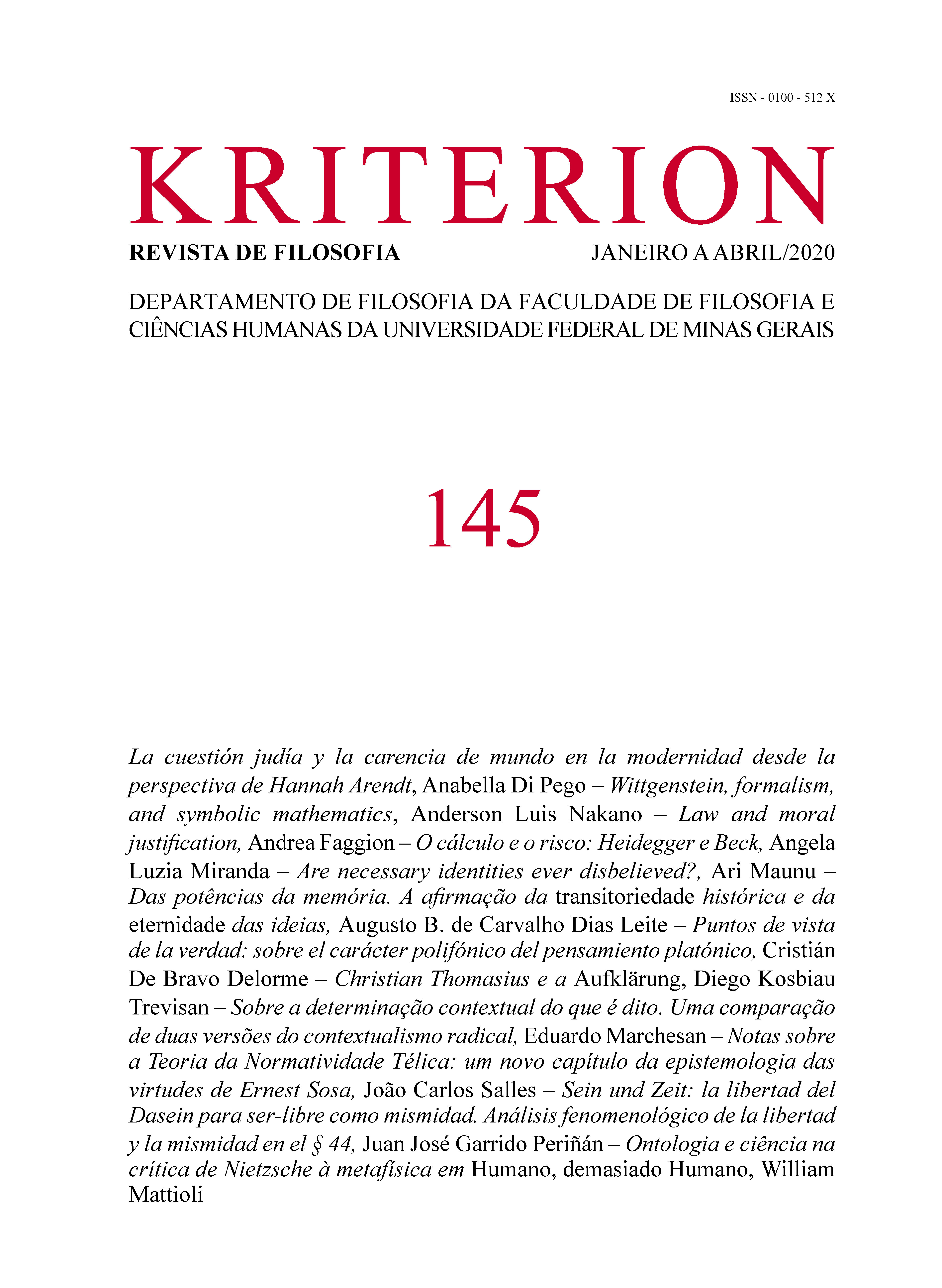LA CUESTIÓN JUDÍA Y LA CARENCIA DE MUNDO EN LA MODERNIDAD DESDE LA PERSPECTIVA DE HANNAH ARENDT
Palavras-chave:
Carencia de hogar,, carencia de mundo,, asimilación,, secularización, pariaResumo
En este trabajo esperamos mostrar la relevancia del análisis arendtiano de la cuestión judía, y en particular de las políticas de asimilación y del proceso de secularización, para abordar el problema de la carencia de mundo en la época moderna. De este modo, la cuestión judía nos permite delinear una incisiva crítica a la configuración del mundo moderno, a la vez que esbozar una concepción ampliada del mundo a través de la reconstrucción de la tradición oculta de los judíos parias. Así, tomando distancia de las interpretaciones que conciben el mundo en Arendt como un espacio de interacción ideal o formal, este recorrido por la problemática judía posibilita el despliegue de los aspectos materiales, culturales e históricos concretos que sustentan el mundo común.
Referências
ARENDT, H. (1968). “Men in Dark Times”. London: Jonathan Cape, 1970.
ARENDT, H. (1951). “The Origins of Totalitarianism”. New York: Harvest Book, 1979.
ARENDT, H. “Essays in Understanding 1930-1954. Formation, Exile, and Totalitarianism”. Ed. Jerome Kohn. New York: Schocken Books, 1994.
ARENDT, H. “Entre el pasado y el futuro. Ocho ejercicios sobre la reflexión política”. Traducción de Anja Poljak. Barcelona: Península, 1996.
ARENDT, H. (1958). “The Human Condition”. Chicago: University of Chicago, 1998.
ARENDT, H. “Los orígenes del totalitarismo”. Traducción de Guillermo Solana. Madrid: Taurus, 1999.
ARENDT, H. “Rahel Varnhagen, vida de una mujer judía”. Ed. Jerome Kohn. Traducción de Daniel Najmías. Barcelona: Lumen, 2000.
ARENDT, H. “La condición humana”. Traducción de Ramón Gil Novales. Barcelona: Paidós, 2001a.
ARENDT, H. “Hombres en tiempos de oscuridad”. Traducción de Claudia Ferrari y Agustín Serrano de Haro. Barcelona: Gedisa, 2001b.
ARENDT, H. “Conferencias sobre la filosofía política de Kant”. Traducción de Carmen Corral. Buenos Aires: Paidós, 2003.
ARENDT, H. “Ensayos de comprensión 1930-1954”. Traducción de Agustín Serrano de Haro. Madrid: Caparrós, 2005.
ARENDT, H. “Vita activa oder Vom tätigen Leben”. München: Piper, 2007a.
ARENDT, H. “The Jewish Writings”. Eds. Jerome Kohn y Ron H. Feldman. New York: Schoken Books, 2007b.
ARENDT, H. “Rahel Varnhagen. Lebensgeschichte einer deutschen Jüdin aus der Romantik“. München: Piper, 2008.
ARENDT, H. “Escritos judíos”. Eds. Jerome Kohn y Ron H. Feldman. Traducción de Miguel Cancel, Rosa Sala Carbó, Vicente Gómez Ibáñez y Eduardo Cañas. Madrid: Paidós, 2009.
ARENDT, H. y JASPERS, K. (1992). “Hannah Arendt and Karl Jaspers. Correspondence 1926-1969”. Eds. Lotte Kohler y Hans Saner. Traducción de Robert Kimber. New York: Harvest Book, 1993.
BEINER, R. “Hannah Arendt y la facultad de juzgar”. In: H. Arendt, 2003. pp. 157-270.BENHABIB, S. (1996). “The reluctant modernism of Hannah Arendt”. Walnut Creek: Altamira Press, 2000.
BENJAMIN, W. “Libro de los pasajes”. Ed. Rolf Tiedemann. Traducción de Luis Fernández Castañeda, Isidro Herrera y Fernando Guerrero. Madrid: Akal, 2005.
BERNSTEIN, R. “Hannah Arendt and the Jewish Question”. Cambridge: Polity Press and Blackwell Publishers, 1996.
BIRULÉS, F. (comp.). “Hannah Arendt. El orgullo de pensar”. Traducción de Xavier Calvo, Martha Hernández, Juan Vivanco y Ángela Ackermann. Barcelona: Gedisa, 2000.
CAMPILLO, N. “Hannah Arendt: lo filosófico y lo político”. Valencia: Universidad de Valencia, 2013.
CANOVAN, M. (1992). “Hannah Arendt. A Reinterpretation of her Political Thought”. Cambridge: University of Cambridge, 2002.
CARMONA HURTADO, J. “Paciencia de la acción. Ensayo sobre la política de asambleas”. Madrid: Akal, 2018.
DI PEGO, A. “La potencialidad política del juicio estético: acerca de la reapropiación arendtiana de Kant”. Isegoría. Revista de Filosofía Moral y Política. Nr. 54, 2016. pp. 541-572. Disponible en: http://isegoria.revistas.csic.es/index.php/isegoria/article/view/936/935 (Accedido el 30 de julio de 2019).
HILB, C. (comp.). “El resplandor de lo público. En torno a Hannah Arendt”. Traducción de Nora López, Viviana Quiñones y Jorge Tula. Caracas: Nueva Sociedad, 1994.
KAFKA, F. “Obras completas”. Tomos I-IV. Barcelona: Edicomunicación, 1999. KIESS, J. “Hannah Arendt and Theology”. London: Bloomsbury, 2016.
LAZARE, B. “L’antisémitisme, son histoire et ses causes”. Paris: Éditions de la différence, 1981.LEIBOVICI, M. “Hannah Arendt y la tradición judía. El judaísmo a prueba de la secularización”. Traducción de Esther Cohen y Silvia Rabinovich. México D.F.: UNAM, 2005.
TAMINIAUX, J. “Acontecimiento, mundo y juicio según Hannah Arendt”. En C. Hilb (comp.), 1994. pp. 125-146.
TASSIN, É. “La phénoménologie de l’action et la question du monde. Essai sur la philosophie de Hannah Arendt” (Tesis de doctorado). Paris: Université de Paris VIII, 1996.
TASSIN, É. “Le trésor perdu. HannahArendt, l’intelligence de l’action politique”. Paris: Éditions Payot & Rivages, 1999.
TRAVERSO, E. “Los judíos y Alemania. Ensayos sobre la ‘simbiosis judío-alemana’”. Traducción de Isabel Sancho García. Valencia: Pre-textos, 2005.
WEBER, M. “Ensayos sobre sociología de la religión”. Tomo II. Traducción de Julio Carabaña y Jorge Vigil. Madrid, España: Taurus, 1998a.
WEBER, M. “Ensayos sobre sociología de la religión”. Tomo III. Traducción de José Almaraz. Madrid, España: Taurus, 1998b.
WELLMER, A. “Hannah Arendt sobre el juicio: La doctrina no escrita de la razón”. En F. Birulés (comp.), 2000. pp. 259-280.
YOUNG-BRUEHL, E. “Hannah Arendt”. Traducción de Manuel Lloris Valdés. Valencia: Alfons el Magnanim, 1993.










